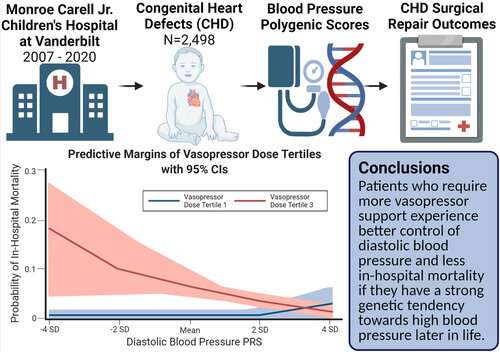High blood pressure genes improve heart surgery survival in children

Children with a genetic makeup that predicts high blood pressure as adults are more likely to survive congenital heart defect repair surgery, according to a new study published in Circulation Research.
The findings could help inform treatment strategies and improve outcomes for children undergoing congenital heart defect repair procedures, said Todd Edwards, Ph.D., associate professor of Medicine and senior author of the study.
"There is substantial variability in outcomes following congenital heart defect repair surgery, and it hasn't been clear why one patient might do well, and another might not," Edwards said. "Our study gives us a foothold—a key insight into this individual variability—and an opportunity to devise strategies for improving outcomes."
Congenital heart defects (CHDs) are the most common birth defects in the United States, affecting about 40,000 babies each year, according to the Centers for Disease Control and Prevention. About half of children with CHDs require surgical repairs or other procedures and are at risk for postoperative complications and death.
To explore contributors to CHD-related complications, Prince Kannankeril, MD, MSCI, a pediatric cardiologist at Monroe Carell Jr. Children's Hospital at Vanderbilt, in 2007 established an ongoing cohort of patients undergoing CHD surgical procedures with detailed clinical information and blood samples.
"This cohort of patients is an exceptional resource on a national scale," said Edwards, a genetic epidemiologist who teamed up with Kannankeril to study genetic variation and CHD outcomes.
Edwards is also a leader in studies of genetic variation associated with a range of conditions in the Million Veteran Program (MVP), a national program to study how genes, lifestyle and military exposures affect health and illness. Using MVP data, Edwards and colleagues discovered more than 200 new genetic variations associated with high blood pressure.
Scientists have been skeptical that genetic variation related to risk of high blood pressure in adults would apply to children, Edwards said. But in 2019, a group in Germany reported that a genetic background of high blood pressure improved survival of preterm infants.
"This was really interesting to us—the idea that discoveries made in adults related to the genetic determinants of a trait like blood pressure could matter in a pediatric population," Edwards said.

Based on the earlier MVP findings, the team developed polygenic risk scores for both systolic and diastolic blood pressure: high scores predict high blood pressure. The researchers analyzed the association of the blood pressure scores in the CHD cohort with death during the hospital stay and with length of stay. The current study included 2,498 infants through young adults who had their first surgery for CHD at Children's Hospital between 2007 and 2020.
The researchers found that children with high diastolic blood pressure scores had reduced risk of in-hospital mortality and reduced time in the ICU and hospital after CHD repair surgery. They discovered that the reduced risk of mortality was related to the interaction of blood pressure variants with the doses of blood pressure-increasing medications (vasopressors).
"We had the idea that if you were more susceptible to hypertension as an adult, you might respond better to vasopressors," said graduate student and first author Joseph Breeyear. "That's exactly what we found: Children with a higher burden of blood pressure-increasing alleles (genetic variants) needed less pharmacological help to achieve a stable blood pressure."
For children who did need higher doses of vasopressors, those with high blood pressure scores had improved survival comparable to children with low blood pressure scores.
"That's a key finding of our study: For patients who are in distress after the procedure (and require higher doses of vasopressors), this blood pressure polygenic risk score matters a lot," Edwards said.
The researchers suggest that predictive models to identify children at risk for adverse outcomes associated with CHD surgery could be improved by adding blood pressure polygenic risk scores.
Edwards noted that as an Army veteran himself, he is particularly pleased that "studies done in veterans are being applied to help young children."
In addition to Edwards, Kannankeril and Breeyear, Vanderbilt authors of the Circulation Research paper include Eric Torstenson and Sara Van Driest, MD, Ph.D.
More information: Joseph H. Breeyear et al, Diastolic Blood Pressure Alleles Improve Congenital Heart Defect Repair Outcomes, Circulation Research (2022). DOI: 10.1161/CIRCRESAHA.121.319842















